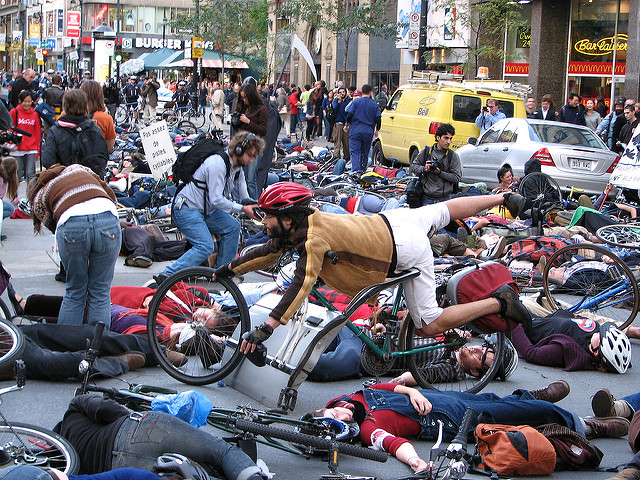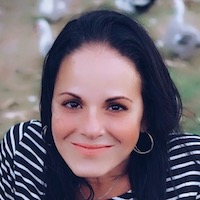I don’t know how to ride a bike.
There it is.
You might as well stop reading.
I’ve kept this hidden from virtually everyone for the past 40 years—my inability to participate in an activity that most children are enjoying by the age of eight and most people apparently never forget.
“It’s like riding a bike,” they say about skills that stay with you forever. Oh really? Well, not for me.
It’s been like this since birth, this disconnect from my physical existence—my fear of losing balance, of getting physically unstuck.
I cannot explain why something that comes so naturally to others is so completely impossible to me. I’ve had occupational therapists, my parents, and my sister attempt in vain to get me to come to that point of equilibrium when both feet are carefully positioned on alternate pedals of this alien vessel. But no such luck.
Balance was and continues to be to me what a sentence is to someone who cannot read. And just like an illiterate, I made my way through childhood with a closet full of tricks to keep my skeletons tightly bolted away.
As a teen in the 90s in Barbados, riding was all that we did. Shiny red and black bikes with intimidating narrow wheels would make their way out on the busy streets several times per week, accompanied by carefree 12 and 13-year-olds. I would join them, fake smiles and corny jokes effectively masking my trepidation.
Superior intelligence gave me a way of participating in the shenanigans of my physically-able biker friends. Blue and green eye shadow, crayons, and markers were my tools for feigning one injury or the next—giving me excuses for why I’d have to sit on someone’s handle bars. My cooperative, and perhaps not totally oblivious crew, never questioned why I had a persistently sprained ankle or twisted wrist or why my scoliosis could get worse if I captained a bike.
Sometimes my sister, who was in on my secret, would ask me to be her passenger, to which I’d happily agree.
I was and am as attached to the concept of riding as I am to flying—as they are equally foreign to me.
Gravity is my neglectful mother, and I am her needy child.
Every time I release my persistently tight grasp of the flat ground, I lose control, fearful of the unpredictability of an incline or a rugged terrain and subconsciously terrified that if I turn my back on gravity she will abandon me and I will fall flat on my face.
In developmental psychology, they call it dyspraxia—this paralysis of mine—a difficulty in planning and carrying out non-habitual motor acts in the correct sequence. But for me, it goes far beyond this clinical definition.
My consciousness constantly lives somewhere on the spectrum of the land of my senses and the reality of my brain. I am always aware of merely being a tenant in the physical house that I’ve been given—the benefactor of numerous refurbishments and upgrades over the years, but nevertheless as foreign to me as if I lived on the moon.
I’ve never been able to effectively connect with other people through activities that require motor ability or bilateral or symmetrical integration of the body.
Even though I live on a tropical island and love the ocean, I am so debilitated by motion sickness that it is impossible to board a boat without a dose-and-a-half of motion stabilizers or fearing a fall because I am so out of balance on the unstable grittiness of a boat’s floor.
When I attempt challenging hikes, I am often the brunt of jokes, sliding and stumbling while I attempt to ascend an incline, feeling paralyzed, and then invariably slipping and tripping when I make my way down hills. My unsteady heels disconnecting from the ground and the unstable terrain rejected by my stubborn and uncooperative body.
Headfirst diving, two hand piano playing, writing extensively with a pen or a pencil—nope, nope, nope.
Coming last in every running race, every competition that requires physical dexterity.
Growing up in the Caribbean, the bom bom vibrating from the windows of the zooming maxi taxis would speak my language, laughing with my soul, waking up my clueless cerebellum, zipping through my body and telling me how to move. That’s why I always loved the predictable and passionate bass of my Caribbean music—she would connect with my heart, allowing me to dance and putting my brain to rest.
This dyspraxia of mine has also been a blessing. It has never failed to remind me that I am not defined by my body. It is not the house of my soul—it is the pawn of my soul. Just as she may not work as well as one of the fancier models, she gets me from A to B, has given me three beautiful children, and, at the age of 40, I am often happy at what looks back at me in the mirror.
This body will not carry me into my next life—we will bid farewell to each other in a few decades and she will decay in the mud. I am grateful to her for all that she has given me and the lessons that I have learned through the challenges that she has presented.
And to gravity, I am grateful to her for being so elusive, for she has given me the strength to rely on my imagination and my talent for writing to not ride, not hike, but to soar beyond the clouds, to unleash my soul from the physical so that I could accumulate greater wisdom and strength than if I had been more connected with the limitations of my skin.
I am not this body.
~
~
~
Author: Daphne Ewing-Chow
Image: Flickr/Kelil Foto
Editor: Travis May
 Share on bsky
Share on bsky






Read 14 comments and reply